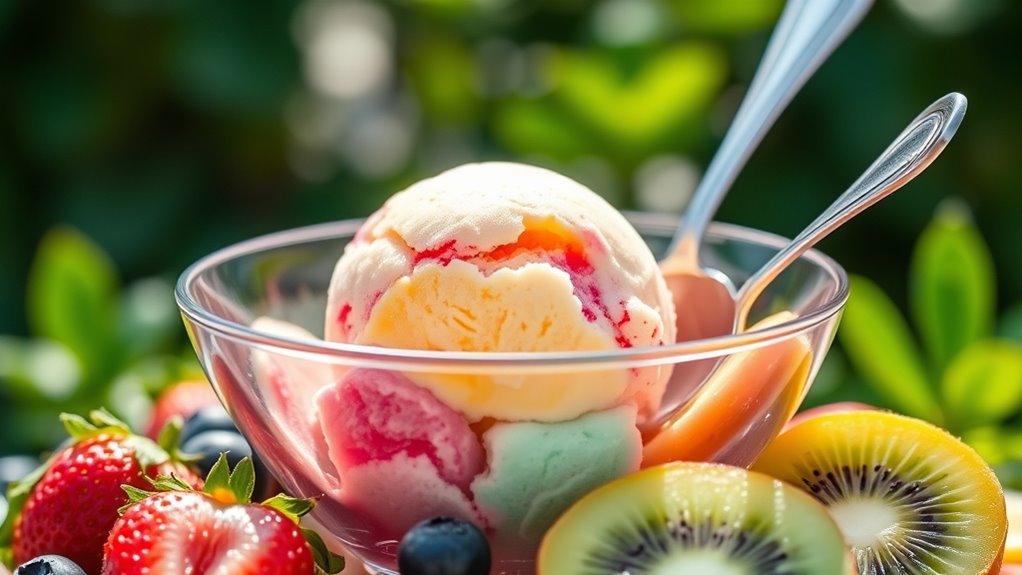Yes, ice cream can fit into a healthy diet when you enjoy it in moderation. Opt for lighter options with under 200 calories and less than 13 grams of added sugar per serving. Keep portion sizes to about 1/2 cup and pair it with a protein source to manage sugar absorption. While it can bring joy and nostalgia, it’s essential to balance indulgence with healthier choices. There’s more to discover about making ice cream a guilt-free treat!
Key Takeaways
- Choose ice cream options with under 200 calories and less than 13 grams of added sugar per serving to maintain a healthier diet.
- Stick to a portion size of 1/2 cup to effectively manage calorie intake while enjoying ice cream.
- Pair ice cream with a source of protein, like nuts, to slow sugar absorption and enhance nutritional balance.
- Prioritize ice cream with at least 10% milk fat for better quality and nutrient content.
- Practice mindful eating and regularly assess dietary habits to ensure balance and moderation in ice cream consumption.
Nutritional Benefits of Ice Cream

When you think about ice cream, you mightn’t immediately consider its nutritional benefits. Surprisingly, this delightful treat packs essential nutrients.
It provides a good source of calcium and phosphorus, vital for strong bones and teeth. Plus, it contains vitamins A, D, and B12, which support vision, immune function, and cell health. Ice cream also contributes to overall mineral intake, making it a tasty way to enhance your nutrition. Additionally, some brands offer lower-calorie versions, catering to health-conscious consumers. Regular consumption of calcium-rich foods like ice cream can also help support bone health, which is crucial as we age. Furthermore, enjoying ice cream can be a great way to celebrate special occasions, bringing joy and connection to moments of happiness. The antioxidants found in cocoa products can also complement the nutritional profile of certain ice creams.
The carbohydrates and fats in ice cream offer a quick energy boost, making it a satisfying indulgence.
Additionally, tryptophan in milk can enhance your mood by increasing serotonin levels, while the enjoyment of ice cream can trigger the release of feel-good hormones like dopamine.
Guidelines for Moderation

To enjoy ice cream without derailing your healthy diet, it’s essential to follow some guidelines for moderation.
Start by choosing healthier ice cream options, like those with fewer than 200 calories and less than 13 grams of added sugar per serving. Stick to a portion size of 1/2 cup to keep calorie intake in check. Ice cream must contain a minimum of 10% milk fat to be labeled as such, so be mindful of the varieties you select. Incorporating nutrient-rich ingredients can also enhance the overall health profile of your dessert. Additionally, be aware that regular consumption of high-fat ice cream can lead to increased heart disease risk and may have other health implications, such as digestive issues if consumed excessively. In fact, the U.S. FDA defines ice cream with a minimum of 10% milkfat, which is important for understanding quality.
Consider pairing ice cream with a source of protein to help slow sugar absorption. Reserve ice cream for special occasions and avoid daily indulgence.
Always check nutrition labels for added sugars and saturated fats.
Finally, enhance your treat with healthier toppings like fruits or nuts instead of sugary options.
Following these tips can help you savor ice cream while maintaining a balanced diet.
Scientific Insights on Ice Cream Consumption

Enjoying ice cream in moderation can be a delightful part of a balanced diet, but understanding its scientific implications adds another layer to your choices. Ice cream provides essential nutrients like vitamins A, D, and B12, along with calcium for bone health. Some varieties even contain probiotics, promoting gut health. Notably, dairy fat consumption has been linked to lower cardiovascular disease risk, which may also be relevant when considering ice cream as part of your diet. Additionally, incorporating omega-3 sources like chia seeds can enhance the nutritional profile of desserts. Historically, chia seeds served as a staple food for ancient civilizations, contributing vital nutrients to their diets. Frozen yogurt, for example, offers a healthier dessert option that is lower in calories and fat compared to traditional ice cream.
Moreover, indulging in homemade varieties like sugar-free vanilla ice cream can further align with healthier dietary choices while still satisfying cravings.
Its calorie density offers a quick energy boost, and the feel-good hormones released during consumption can enhance your mood. However, be mindful of added sugars and saturated fats, as excessive intake may lead to health issues such as obesity and heart disease. While moderate consumption might reduce cardiovascular risks and improve insulin sensitivity, it’s crucial to enjoy ice cream as part of a balanced diet to maximize benefits and minimize drawbacks.
Social and Emotional Aspects of Enjoying Ice Cream

Ice cream isn’t just a tasty treat; it’s also a source of emotional comfort and social connection. When you indulge in this delightful dessert, it often evokes feelings of happiness and nostalgia, enhancing your mood and providing a sense of joy. National Ice Cream Day, celebrated on July 17th, serves as a reminder to embrace this joyful indulgence with friends and family. Additionally, creating innovative approaches to enjoy this treat can enhance the experience and make it more memorable. The simple act of sharing this sweet delight can remind us of the importance of love and compassion in our relationships.
Moreover, the ritual of enjoying ice cream can serve as a form of morning motivation, setting a positive tone for your day ahead.
Sharing ice cream with friends or family can strengthen your social bonds, creating memorable experiences that foster community. Whether you’re enjoying a cone at an ice cream social or gifting a pint to a loved one, these moments can generate kindness and connection. Furthermore, the magic of celebrity relationships often highlights how shared indulgences, like ice cream, can bring people closer together.
Plus, the sensory experience of different flavors can spark cherished memories, linking you to personal traditions and cultural significance. Ultimately, enjoying ice cream enriches your emotional well-being and social life.
Potential Risks of Excessive Consumption

While indulging in a scoop of ice cream can be a delightful experience, excessive consumption carries potential health risks that shouldn’t be overlooked.
Regularly indulging can lead to increased sugar intake, raising your risk of obesity and type 2 diabetes. The saturated fat in many ice creams can elevate “bad” cholesterol levels, potentially leading to heart disease. Additionally, continuous high sugar intake heightens the risk of chronic conditions like diabetes and heart disease. Consuming too much sugar can also lead to nutritional imbalances, as it often displaces healthier food choices in your diet. Moreover, a high-sugar diet can compromise your overall health by increasing inflammation in the body. Breast cancer risk factors can also be influenced by lifestyle choices, including diet, which highlights the importance of maintaining a balanced diet with early detection measures like regular screenings.
If you’re lactose intolerant, you might face digestive issues like bloating and gas. Additionally, the sugar can contribute to tooth decay and enamel erosion.
Frequent consumption may also result in nutritional imbalances, as prioritizing ice cream over healthier foods affects your overall diet. To enjoy ice cream responsibly, balance it with nutrient-dense choices and moderation.
Frequently Asked Questions
What Are Healthier Ice Cream Alternatives Available?
If you’re looking for healthier ice cream alternatives, you’ve got some great options!
Brands like Nick’s and Halo Top offer low-calorie choices with natural sweeteners. Enlightened provides high-protein, low-sugar options, while Talenti gelato has less fat.
You can also make your own, such as sugar-free Greek yogurt ice cream or peanut butter banana ice cream.
For a dairy-free treat, try coconut milk ice cream or sorbet.
Enjoy exploring these delicious alternatives!
Can Lactose-Intolerant Individuals Enjoy Ice Cream?
Imagine you’re at a party, and everyone’s enjoying ice cream. You don’t want to miss out just because you’re lactose intolerant.
Fortunately, you can! Brands like LACTAID offer delicious lactose-free options, letting you indulge without discomfort. You could also try dairy-free choices from Jeni’s or Halo Top.
With these alternatives, you can savor the creamy goodness while keeping your digestive health in check. Enjoying ice cream is definitely possible for you!
How Can I Make Homemade Ice Cream Healthier?
To make homemade ice cream healthier, start by choosing a nutritious base like Greek yogurt or coconut milk.
Sweeten it naturally with honey or maple syrup, and consider adding frozen fruits for extra flavor.
Incorporate nuts or seeds for texture, and boost taste with spices like cinnamon.
Keep portions in check, and enjoy your creation as an occasional treat.
This way, you can indulge without straying too far from your health goals!
Are There Specific Flavors With Better Nutritional Profiles?
Imagine tasting a creamy cloud of delight while knowing you’re making a smart choice.
When choosing ice cream, look for flavors with lower calories, like vanilla from Nick’s or Halo Top, which pack in protein and fiber.
Sugar-free options, like those from Rebel, cater to low-sugar diets, while dairy-free varieties, such as Cado, offer lower fat content.
Always check the labels to find the hidden gems with the best nutritional profiles!
Can Ice Cream Fit Into a Weight Loss Plan?
Yes, ice cream can fit into your weight loss plan if you manage portions wisely.
Focus on enjoying it as an occasional treat rather than a daily staple. Control your serving size to maintain a calorie deficit, and consider healthier alternatives like lower-fat options or adding fruit.
Conclusion
Think of ice cream as a delightful butterfly in your garden of nutrition. When you savor it in moderation, it adds vibrant colors and joy to your diet. But if you chase it too passionately, it can flit away, leaving you with regret. Embrace the sweetness responsibly, and let it flutter through your life, enhancing your experiences without overshadowing the wholesome flowers that nourish you. Balance is the key to keeping your garden flourishing and your heart happy.









